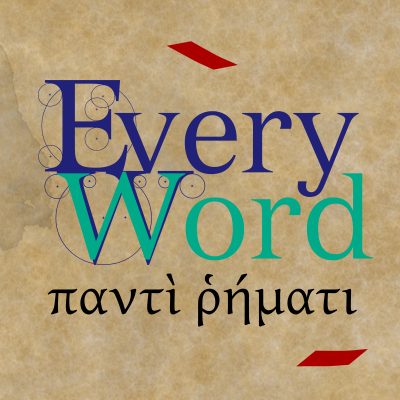Reader: Take note! Days 1-14
Description
Greetings and welcome to this first edition of an occasional series of podcasts that I am starting to add extra commentary for those following the Digging Deeper Daily reading plan. I hope that the things I share in this episode will be relevant to those who have arrived at day number 14.
I have taken the title for this series from Mark 13:14 (GW). As Jesus is prophesying in that chapter about the destruction of Jerusalem, he says, “When you see the disgusting thing that will cause destruction standing where it should not (let the reader take note), those of you in Judea should flee to the mountains.” [God’s Word Translation]
The parenthetical note, “let the reader take note” probably was addressed to the one who read out loud to others. In Mark’s day, not many people in a congregation would know how to read. The Greek word for ‘read’ in this verse actually means ‘to read out loud’. Because of that, some commentators feel that this warning to understand was not just for the reader, but was intended as a plea to the reader to explain to his listeners about Daniel’s prophecy that mentions ‘the disgusting thing that will cause destruction’. So here I am, your reader (for the whole Bible, not just Mark’s Gospel). I thought it might be helpful to you to give some information that doesn’t fit in the daily podcasts, but I still, of course, will not have time to answer all questions. My intent is to encourage you to dig deeper by sharing things I find to be interesting and inspiring in the passages you have read or listened to already in the 3D plan.
If you have questions or comments, my favorite way for you to send messages to me is via the contact button at dailybiblereading.info.
Incidentally, from now on I will quote a lot from the translation called God’s Word for the Nations, because I am personally reading that version in my own devotional readings this year. And this year I personally am reading a real-book Bible. See the godsword.org site linked in the episode notes for information on how you can get a gorgeous GW Bible at a great price. And the newest edition is available in YouVersion and the MyBible app. (GW'20)
The first verse I would like to share about is Genesis 1:1 (NLT). “In the beginning God created the heavens and the earth.”
Some translations say ‘heaven’ singular, but the Hebrew is actually plural, ‘heavens’. When my team and I translated that into Indonesian, because Indonesians haven’t previously known a concept of plural heavens, we translated this verse as, “… God created the levels of heaven and the sky.”
When Scripture talks of plural heavens, the sky is the lowest layer, and ancient people had the concept that there were three or perhaps seven layers of heaven. Some of you will recall that Paul was caught up to the ‘third heaven’ in 2 Corinthians 12.
It is for this reason that I see verse one as not being a summary of what is to come in Genesis 1-2, but as a hint of acts of creation that we are not told about which happened before the creation of this world. There were principalities and powers and myriads of angels in the heavenly places that were put there before God started counting the six days of creation. To me, it is kind of awesome to think about that.
Now quoting from Genesis 1:14 (NLT), “Then God said, “Let lights appear in the sky to separate the day from the night. Let them be signs to mark the seasons, days, and years.”
Instead of ‘seasons’ the God’s Word translation translates ‘religious festivals’.
The word that can mean ‘seasons’ as NLT translated it is normally translated ‘religious festivals’ all throughout the rest of the OT. In our Indonesian translation, we translated it as ‘seasons’ but we provided a footnote to tell readers that this word often is translated as ‘religious festivals’.
Here’s the thing I think that is neat about this: Translators have frequently chosen to translate ‘seasons’ because it is kind of strange to talk of religious festivals when there are not yet any people on earth on the 4th day of creation. BUT consider this: God was preparing all of creation, including the sun and moon, to support humans who would worship Him. We can say that the love and worship of Himself was God’s ultimate goal in the creation of the universe. We exist for his worship.
In Genesis 4:19-21 we read that, “Lamech married two women, one named Adah and the other Zillah. Adah gave birth to Jabal. He was the first person to live in tents and have livestock. His brother’s name was Jubal. He was the first person to play the harp and the flute.”
Isn’t it interesting that the harp and flute are mentioned so early in human history! Certainly Jubal not only played the flute and harp, but he invented and constructed the first ones as well. I think this little story shows that God wanted to provide for glorious worship of Himself.
Did you realize that when you hear an instrument play a note, that you don’t just hear that note, but harmonic frequencies above that note. It is the relative strength and weaknesses of the harmonics that lets us hear the difference between the sounds of a harp, flute, trumpet, and all the other instruments.
As I play a low D on the piano, I will help you hear the harmonics.
Fundamental note D, octave D, 5th above that, then the octave again, and then another D, and the last that I will play is a third, F#. That forms a D major chord.
This happens to be the same overtones that can be gotten with a simple flute made of PVC pipe keeping all my fingers down. The natural harmonics of the strings of a harp or piano or guitar, form a major chord. The natural harmonics of well-constructed flutes form a major chord. God built this system right into the atmosphere and physics of our world.
There is a reason why people think songs in major keys are happy sounding. Our ears like the resonance that naturally occurs due to the reinforcement of overtones. I think God intended this beautiful resonance. God created the human ear, in order to give the delight of hearing beautiful music. Note also that God designed the human hand so that simple instruments like a harp and flute can be played easily with our fingers, like when I play a scale on a flute with just 6 finger holes. Then consider how beautiful our voices are when we sing. My friend Arie Scholten says, “When people sing in unison together, we each coordinate 26 muscles together in unity, and the devil hates both the sound and that unity.”
Our Creator is awesome and deserves awesome praise.
Ps 66:1-2: "Shout happily to God, all the earth! Make music to praise the glory of his name. Make his praise glorious."
Now let me explain something that people always ask about:
NLT Genesis 6:1-4:
1 Then the people began to multiply on the earth, and daughters were born to them. 2 The sons of God saw the beautiful women and took any they wanted as their wives. 3 Then the LORD said, “My Spirit will not put up with humans for such a long time, for they are only mortal flesh. In the future, their normal lifespan will be no more than 120 years.” 4 In those days, and for some time after, giant Nephilites lived on the earth, for whenever the sons of God had intercourse with women, they gave birth to children who became the heroes and famous warriors of ancient times.
NLT Genesis 6:5:
5 The LORD observed the extent of human wickedness on the earth, …
So who are these sons of God? There are many interpretations of what kind of ‘sons’ are intended. Most interpretations can be classified into two alternatives: 1) The children of God intended are fallen angels— those who sided with the devil in his rebellion, then they were punished by God and thrown into this world. Those angels are now called evil spirits or demons. If so, maybe the spirits possessed male humans, and in that way married the girls. 2) Or, the children of God intended are descendants of Seth. This is in accordance with many verses in the OT that call the Israelites— all of whom were descendants of Seth— as ‘sons of God’. In Ex. 4:22 , the nation of Israel is also called the ‘firstborn son’ of God.
<span style="font-weig
























